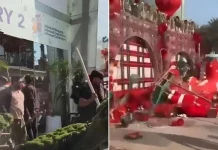KARACHI: Expressing its serious concerns over the worsening conditions of civic infrastructure in Karachi, the Supreme Court has observed that it seemed that the provincial government and local civic agencies do not appear interested in working in the metropolis.
It ordered the Sindh Chief Minister to sit with the Karachi mayor and all civic agencies to resolve the issues with “absolute promptness” to save the city from massive collapse.
A two-judge bench comprising Justices Gulzar Ahmed and Mazhar Alam Khan Miankhel gave these directions in a detailed ordered released recently after it heard on Thursday a case regarding removal of illegal encroachments from parks, playgrounds and other amenity spaces in the city, at the SC’s Karachi registry.
About Karachi, the bench noted in its order: “There are no trees, no greenery, no parks, no playgrounds, no roads, no hospitals, no universities, no schools, no colleges except those which were made by the government somewhere about 40 years ago.”
The chief minister is told to sit with Karachi mayor and other civic bodies for solution of city’s problems; KPT chairman told to cancel allotment of all port’s land
It further stated: “No water, no sewerage, no safe and secure and decent recreation and shopping areas. There is on all roads katcha or pukka dirt, filth, heaps of garbage, sewerage water, defaced walls, incomplete and unpainted ghostly haunted structures, ruined buildings in state of imminent collapse, stray dogs menace, no fumigation of the city to rid itself form dangerous life-threatening germs and mosquitoes. Graveyard spaces have become scarce.
“It is no more a city of lights which is being portrayed by the city administration nor is this the city of gardens. Karachi has no semblance of a city rather it looks like a big chunk of a slum.”
It stated that Karachi Mayor Wasim Akhtar said he had no power to do any work for the city as all his powers had been taken over by the Sindh government and it was now running the city through its secretaries, including the home secretary.

The home secretary was doing the development work of the city although the rules of business did not provide for any such work being done by him, he informed the bench.
The bench said that it was strange that secretaries, who were supposed to look after the whole province to attend to their respective work, rather had been allowed to work for the development of Karachi. It noted that they were not informed by anyone that such activity of the provincial secretaries was legal and permissible by the law.
CS asked why local govt of Karachi made functionless
It directed the chief secretary to submit a proper report explaining as to why the local government of Karachi had been made functionless for that it was not prepared to take responsibility in respect of any of the development works in the city, as the mayor further stated that his financial powers had also been taken away and all income of the city was being received by the Sindh government.
The order said: “Whatever may be the status of various functionaries of Sindh government, local government or all other civic agencies, which are responsible for dealing with the affairs of the city of Karachi, the most sorry situation is that none of the agencies seem to be working or even interested in working and there is absolutely total collapse of the civic agencies in the city of Karachi and there seems to be no manner in sight where it can be seen that any work is being done to remedy this situation.”
It said: “The difficulty is that the employees sitting in these agencies have created their own personal interest and thus their very utility in these agencies have become questionable.”
The bench said constructions had been made all over without taking into consideration the very “viability, permissibility, suitability or legality” of such construction at the place where they had been raised.
“No city planner and developer or proper architect, engineer and environmental agencies is involved in such work and everything is going on through the hands of people, who are not at all qualified to undertake the same,” the order stated.
It noted that there were so many katchi abadis in the city and even the government quarters looked like slums. “Obviously such aspect of the matter has to be addressed by the Sindh government along with the mayor Karachi to ensure that all these places and their inhabitants are appropriately located in a decent manner as was done in other countries.
“We do not expect any sort of a miracle in undertaking all such activity but at least some modest basic steps should be undertaken to avoid massive collapse of the city,” the order said.
The bench said: “We do expect the Sindh CM [to] sit with all the agencies of the city of Karachi and also mayor Karachi to resolve these and other grave issues facing the city and such be done with absolute promptness for that the situation is worsening day by day.”
On a complaint by the Karachi commissioner that most of the footpaths in the city were occupied by police and Rangers by making constructions on them, the bench ordered: “Let the IG Police and DG Rangers appear before the court along with their respective reports on the next date of hearing ensuring that the footpaths of the roads were not used for any sort of construction.”
No footpath can be occupied by any entity, rules SC
The commissioner also raised the issue that the footpaths encroached upon around the Metropole Hotel, by the Village restaurant’s management and other occupants and said that in respect of such occupation of the footpaths some order had been passed by the Sindh High Court.
The court order stated: “With due deference to the orders that may have been passed by the SHC we may note that no footpath can be occupied by any entity including entities working for social purposes and all these occupations are to be removed.”
It further ordered that all occupations of the footpath and open land in front of the Aga Khan, Jinnah, Civil, Abbasi Shaheed, Services and SIUT hospitals should be cleared and the city should be made walkable and that pedestrian rights had to be protected.
The Supreme Court ordered the city government to ensure that proper bridges for pedestrians were constructed all over the city for safe crossing of roads, roads signs, including zebra crossings, road lines, road infrastructure and all other road requirements be met in accordance with law and standard of requirements.
It further ordered that the open spaces and service streets and roads occupied by the commercial organisations, shops and hotels shall be removed and restored for use.
The apex court directed the Sindh CM to implement this order and file a compliance report in court.
Retrieval of three amenity plots in DHA ordered
The bench also directed the administrator of the Defence Housing Authority to retrieve three amenity plots from encroachers and make them available for the general public.
It directed the DHA administrator to look into the open plots surrounded by broken boundary walls on the left side of the Kalapul.
The bench noted that another piece of land with boundary wall adjacent to the National Medical Centre was also being misused despite the fact that it had to remain open. But it seemed that some sort of parking place had been made on it and it seemed to be exploited.
The court order stated that a partial encroachment in front of Masjid-i-Tooba had been removed, but there was a big chunk of land surrounded by a boundary wall and it was still being used for parking and unlawful exploitation.
The order stated that this land needed to be cleared and applied for enjoyment of the general public and residents of the DHA.
The court directed the DHA administrator to submit a report regarding these aspects on the next date of hearing.
KPT chief told to cancel allotment/lease of port’s land
The apex court directed the chairman of the Karachi Port Trust (KPT) to immediately cancel whatever allotment, lease or transfer had taken place in respect of the land belonging to the port and revert back the land to the port.
The bench noted that the KPT chairman was directed to appear before the court during Thursday’s proceedings, but he was absent.
The apex court directed him to personally appear in court on the next date of hearing and submit a report mentioning that all the port lands were used for the port purpose only in accordance with the KPT Act and that no land whatsoever of the port was either sold/transferred, leased, allotted to any person or its employees.
The judges observed that the land on both sides of the Mai Kolachi Road was full of mangroves at one time with the passage of seawater. “Now, there is barren land and the passage of seawater has been blocked,” the bench deplored.
The court ordered the KPT chairman to also ensure that plantation of the mangroves was made on both sides of the Mai Kolachi Road and the flow of seawater was restored touching the Bath Island area.



